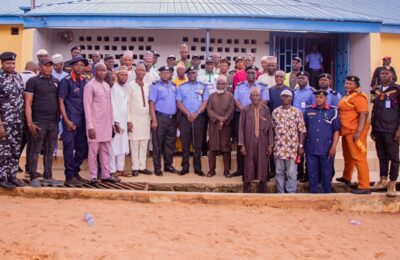Nigeria is facing a climate crisis, and its effects are rippling across the nation. From the farmlands of the North to the coastal plains in the South, Nigeria’s weather patterns are growing erratic, and farmers are feeling the brunt especially in this farming season. What once was a land of agricultural abundance is now witnessing the collapse of its farming sector. This crisis threatens not only the economy but also the livelihoods of millions of Nigerians, especially those whose very survival is tied to the land.
The heart of Nigeria’s food production—its farmers—are increasingly vulnerable to unpredictable weather. Farmers in Kaduna, Kwara, Ogun, and other farming regions are no longer sure of when the rains will come. And when they do come, the rains can be either too much or too little, causing crops to rot or wither before they even take root.
“We are frustrated with mounting losses resulting from the variability of weather,” says Elizabeth Ukah, a smallholder farmer from Kaduna State. “The rain used to be reliable. Now, it either comes too late or stays too long. It’s hard to plan anymore.”
(Climate Change News, 2020)
The root causes of these shifts in weather are clear. Nigeria, like many other nations, has been complicit in its contribution to global climate change. The combustion of fossil fuels, deforestation, and indiscriminate bush burning have played a part in driving up greenhouse gas emissions. As the planet warms, Nigeria is experiencing more frequent floods, extreme heatwaves, and prolonged droughts. These environmental changes are disrupting the delicate balance that farmers rely on for survival.
“A combination of decreasing rainfall, increasing temperatures, and more unpredictable weather patterns will destroy the economic livelihood of people,” warns Dr. Agnes Kalibata, President of AGRA (Alliance for a Green Revolution in Africa).
(Medium, 2023)
Across Nigeria, the impact on farming is clear. Rice fields in Kebbi are being inundated by floods, while farmers in Oyo are watching their once-thriving cassava farms wither from the heat. The unpredictable rains have led to crop failures, and this has led to skyrocketing food prices. Families are struggling, and communities are feeling the pressure of an economy built on agriculture that is now crumbling under the weight of a changing climate.
The impact of climate change extends far beyond the fields. The agricultural sector contributes significantly to Nigeria’s economy, providing employment for over 60% of the population. The declining productivity of farms will soon lead to greater food insecurity, increased poverty, and even mass migration. As crops fail and the land turns barren, more Nigerians will be forced to leave their homes in search of better opportunities, potentially creating a humanitarian crisis.
But the situation isn’t all doom and gloom. Nigerians are proving resilient. Across the country, farmers, researchers, and organisations are working together to find innovative solutions to adapt to the changing climate. In some areas, farmers are adopting climate-smart agricultural practices, such as planting drought-resistant crops and using sustainable irrigation methods to make the most out of irregular rainfall. Others are turning to agroforestry, planting trees alongside their crops to help conserve soil moisture, sequester carbon, and provide additional income streams.

One such innovation comes from Uka Eje, CEO of ThriveAgric, a leading agricultural technology company in Nigeria. ThriveAgric is helping farmers access resources like mobile-based financing, knowledge on sustainable farming practices, and the ability to track weather patterns and plan their planting seasons accordingly.
“We’re teaching farmers to adapt to the new climate reality,” says Uka Eje. “Farmers who use technology to track weather patterns are able to make better decisions and secure their livelihoods despite the changing climate.”
(Time Magazine, 2024)
Government policies, however, have been slow to adapt. Nigeria’s leaders must urgently implement long-term solutions to combat the impacts of climate change. While there have been efforts to raise awareness, more needs to be done. Policies must focus on building climate-resilient infrastructure, providing incentives for sustainable farming, and investing in research and development of climate-resilient crops. These solutions are not just about mitigating the current effects of climate change—they are about future-proofing Nigeria’s food systems for generations to come.
As Pastor Chris Oyakhilome once said, “When the earth groans, it is not a time for silence, but for action.” Nigeria must act now, or the consequences will be devastating. A nation that depends on its land cannot afford to let it go to waste. The time for action is now.
Indeed, the crisis Nigeria faces is not just environmental, but moral. It’s a question of survival, of ensuring that the next generation inherits a land capable of sustaining them. If climate change is a global challenge, then Nigeria has a duty to be part of the solution. The youth, the farmers, and the policymakers must all come together to fight this battle.
In this fight, Nigeria must lead. The resilience of its people, their creativity, and determination to protect their land can turn the tide on climate change. It is time to plant not just seeds of crops, but seeds of hope, sustainable growth, and a future where agriculture thrives despite the changing climate.
The climate is changing. Nigeria must change with it.
And it begins with you. With me. With all of us.





